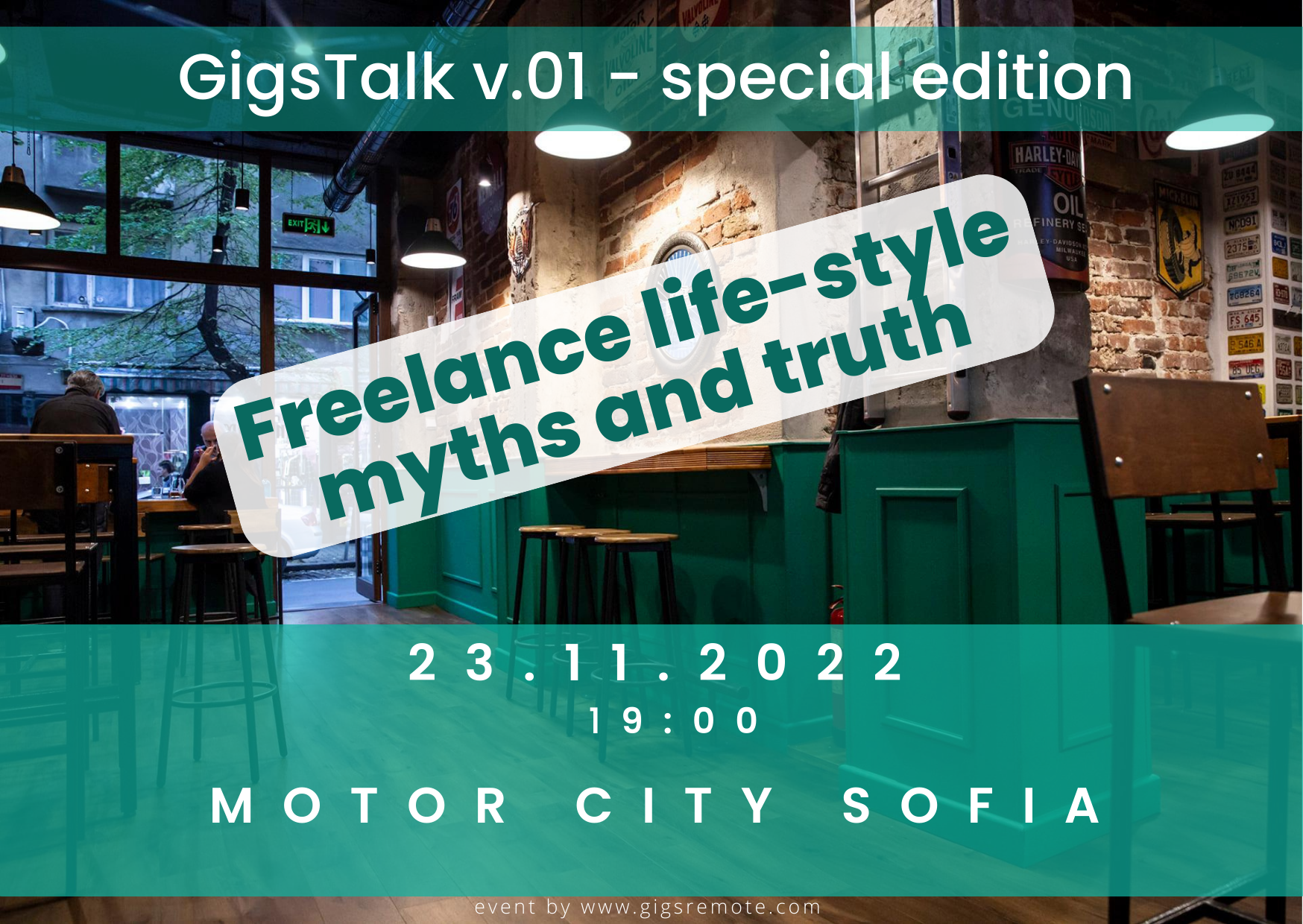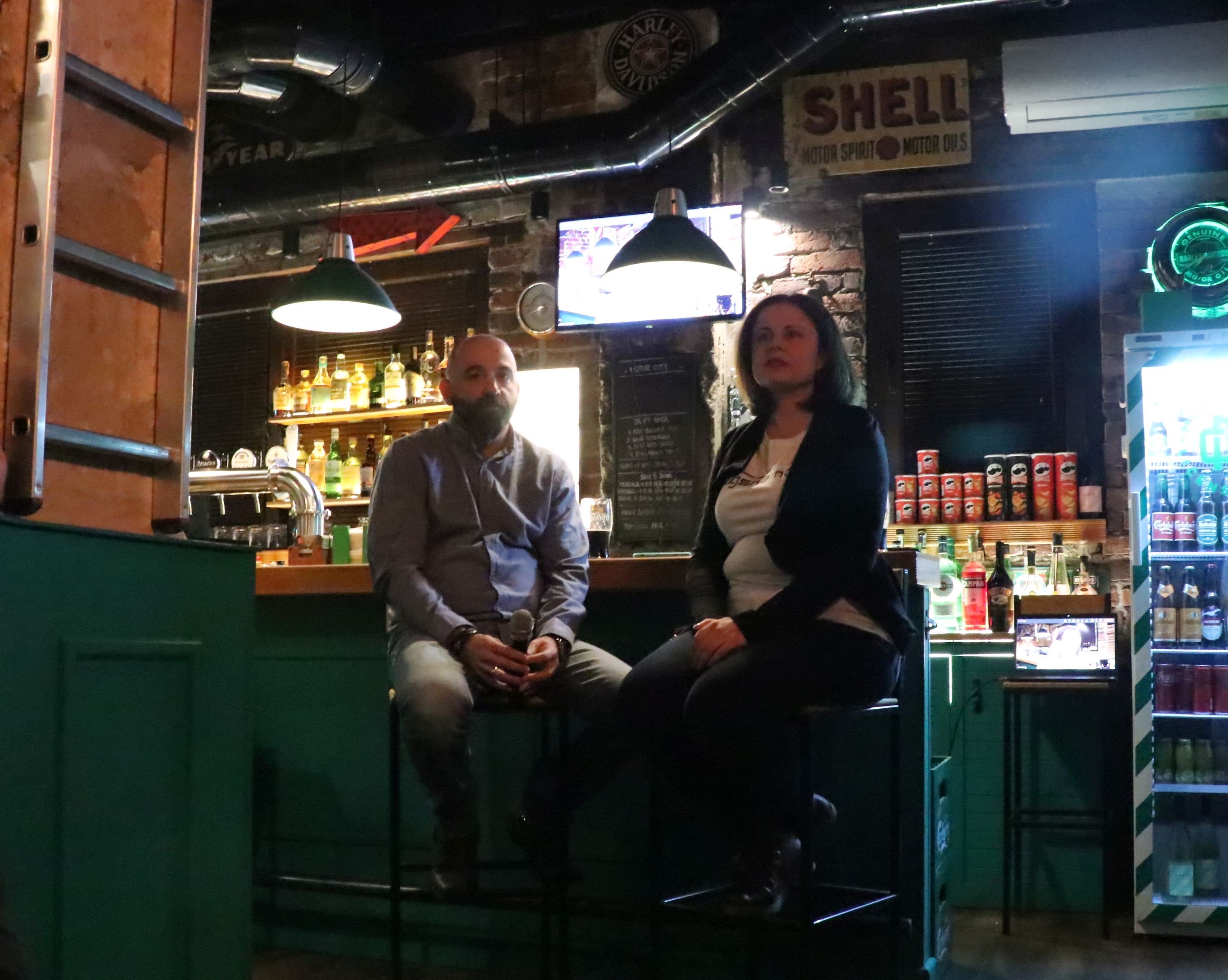Gigs Talk v0.1 - our first community event
The Community
We are in this business because of our passion for people, for their development, both professional and personal. We are here to create human connections and to grow an outstanding community of freelancers in Eastern Europe. So when we talk about community we are very excited and get fully involved. The freelancers within the GigsRemote community are an amazing group of people with qualities that we love - discipline, responsibility, professionalism, thirst for knowledge, thirst for self-development, and more.
It is natural that communities are based on sharing. So we thought we quickly start with the GigsRemote knowledge and experience sharing sessions Gigs Talk, series of more to come!
The format of Gigs Talk
Gigs Talk is all about discussions and the freedom to share and ask. Our goal is to introduce IT professionals who have chosen a different way of life, at least different to the old school labor contract mode. Proven experts who have worked on exciting projects on a freelance basis. They would start with focusing on a couple important to them talking about freelancing and continue with answering questions from the IT freelancers audience. Gigs Talk is about covering the multiple aspects of IT freelancing and sharing experience with likeminded professionals.
The first Gigs Talk event

Seeing our community at a physical event for the first time got us excited. We've already had multiple chats and video talks with the hundreds of "gigsters", but having a beer and talking gigs stories was a blessing.
In the first-ever special edition of GigsTalk, we focused on what's real and what's just a myth about the free IT birds.
Our guests were Lyubomira Mihaylova and Dilyan Bachvarov.
Do you want to be a part of our community of freelancers? Sign-up here .
Here's a snippet of our talk:
| How did you decide to become a freelancer? |
Dilyan: It worked for me on the second try. At the beginning of 2007, I worked in a Dutch company founded by three freelancers who took projects in the Netherlands and realized them with the help of the teams they hired in Bulgaria. The projects were from quite a wide range of the software technologies spectrum, but mostly with Java and frameworks based on Java. I was also so to speak "scattered" in the technologies of and around the Java world. With Bulgaria's accession to the EU, they offered me to become a freelancer. I was offered a contract, but after I reviewed it I declined the offer. This was the first attempt and I was not at all prepared either as a domain or as a freelancer idea.
The second attempt was after I had already built a name and experience in a niche field - Hybris (now better known as SAP Commerce) and after some experience as a shared-resource in related projects with this technology. Then the idea that I was ready to freelance matured and I signed my first contract as a freelancer in 2019. Since then I have successfully participated in various projects as a freelancer.
Lybomira: After a career in Bulgaria and then in England, life presented me with the next challenge and a new choice. I moved to Spain and in the course of the new beginning, I had different options in what form to work in the country. At first glance, it was scary to start over again. On the other hand, the thrill of the temptation to explore new horizons prevailed. After consulting with local, Spanish law and accounting firms, I followed the recommendation to take on an "autónomo" or freelancer in Spain.
| Was there a change in the way of thinking? |
Dilyan: Oh yeah. Definitely, the thinking should be like that of an employer (in the case of yourself), not like an employee. I had a "failed" experience that gave me a very good preparation for my future thinking as a freelancer. In 2000, as a young specialist, my colleague, and friend from Sofia University got a chance to win a project in Taiwan for a large concern in the production and distribution of auto parts. A mutual friend of ours with whom we had worked at the University of Nottingham had "introduced" us and thus given us a chance to try to win this project. We went to Taiwan and won the project, after which we worked from Bulgaria on it and subsequently decided to establish a company. We founded a company and things went well because the Taiwanese concern assigned us another project and we had two. But unfortunately, after 3 years both projects ended and the Taiwanese could only offer us support with more work. So it turned out that, despite being successful specialists, we were missing something. There was no one to look for projects - we were neither specialists in this nor did we have time, because we were the only employees of our company and accordingly we dealt with the technical part of the already available projects. So my partner went to Western Europe, and I, after the maintenance of the Taiwanese systems was finished, had to look for a job and close the company. Even then, this experience made me understand that good technical literacy and the search for projects are equally important. This experience actually helped me a lot in starting my freelance business.
Lybomira: For me, a change in the way of thinking is inevitable. When you were an employee during your professional career, there were people to take care of invoices, contracts, notes, and administrative and financial reports. You get paid at the end of the month and you do the best you can. When you're a freelancer, it's true that you don't have a "boss", but you also need to be willing to take on some of the boss's duties and responsibilities. You have unlimited freedom in terms of time, place, and organization of the work process. You can work on Sunday and rest on Monday. The important thing is that the project is completed and that the client's requirements are met. The result is important, not when, how, where and why you achieved it.
| How has your life changed? |
Dilyan: Well, I wouldn't say that life has changed much. I was still doing the same thing. I was developing software (or programming), but actually, the change is that from 8 to 5 programming things are actually changing to by overall employment and dedication, which includes everything through the search for projects, contact with various sources of projects (research sites, agencies, direct companies, and other contacts), through interviews (unlike working in a company, here interviews are much more frequent) and again "making" software.
Lybomira: During the first months it was difficult for me to find the right rhythm for myself. The additional duties seemed to be too much for me. But after I "pulled myself together" and managed to build the necessary discipline and practice to avoid piling up administrative tasks at the end of the month or the end of the quarter, freelancing turned into a way of life, a personal approach to work.
| What has freelancing given you and what has it taken away? |
Dilyan: Freelancing definitely gives a wide range of development and freedom - you decide what, how much and when, but on the other hand it takes away from your free time because outside of 8-5 you can "code" (or build software) there are quite a few additional activities that you need to do, such as reports, accounting, maintaining contracts, looking for the next contract/project and the related engagement, which is most of the time outside of 8-5.
Lybomira: At certain times it takes me a little longer. But this additional time investment has been repaid many times over by what freelancing gives me, namely freedom, professional scope, personal responsibility, and wider horizons.
| What surprised you? |
Dilyan: I'm surprised that it's not as impossible as I thought it would be before I started doing it. And even though there is a bit more tension (because of the "unpredictability" of whether and when there will be the next project), still for me the satisfaction is much more than when working for any company (no matter how big - I worked for example for IBM) of an employment contract.
Lybomira: I was surprised by the fact that I imagined it worse. You have the hump of the big organization behind you, sometimes you don't know whom to ask and you have to find out how things are in certain areas yourself. You don’t have "colleagues". You have to make most of the business decisions yourself. And it turned out that it is not scary, it just requires more concentration, discipline, and responsibility.
| What do you miss from the time you were on an employment contract? |
Dilyan: The only thing I miss is the peace of mind one gets when working for a contract, The only thing you have to worry about is being at work and coding from 8-5.
And I think that's also the problem facing people who have to choose whether to go into freelancing.
Lybomira: I wouldn't say I'm missing anything. My "boss" is a client, and "colleagues" change according to the project. Perhaps to any extent, the sense of belonging to a large organization is sometimes lacking. But the opportunities and the horizons have their price. :)
| What is it that makes you decide to continue being a freelancer? |
Dilyan: For me personally, what makes me continue is the satisfaction of a won and completed project and that it only depends on you (if there are other factors - such as market demand and crises), but in general it depends on you.
A preview can be given that freelancing is like sports - every project won and as a win, every dropped as a loss. At the end of the season, the title and a good ranking are important, in envy.
Lybomira: Because of the freedom and the wider perspective. I have also learned to take on greater personal responsibilities and a step back would be challenging at this time. :)



